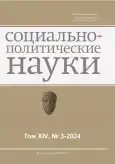Orthodoxy in the perspective of the formation of compliance with legal, journalistic, scientific-historical and artistic social subcultures in the second quarter of the 19th century (according to National Corpus Of The Russian Language)
- Autores: Markova N.M.1, Arinin E.I.1, Golenko V.V.1, Pavlov M.S.1
-
Afiliações:
- Vladimdir State University named after Alexander and Nikolay Stoletovs
- Edição: Volume 14, Nº 3 (2024)
- Páginas: 171-180
- Seção: Philosophy of religion and religious studies
- URL: https://journals.eco-vector.com/2223-0092/article/view/635489
- DOI: https://doi.org/10.33693/2223-0092-2024-14-3-171-180
- EDN: https://elibrary.ru/KKSPAG
- ID: 635489
Citar
Texto integral
Resumo
The second quarter of the XIX century became the era of the reign of Nicholas the First, when the number of texts with the lexeme “Orthodoxy,” according to the materials of the linguistic academic resource “National Corpus of the Russian Language,” exceeded their volume for the entire XVIII century. We can say about continuation of the formation of an academic tradition of objective description of confessional, ethnic, ethno-confessional and religious communities in a multi-confessional country of the Enlightenment, combined with the formation of the so-called “protective” direction in politics. In search of compensation (consent) between the court, legal, journalistic, church and scientific elites, new denotations and connotations are formed (for example, “Orthodoxy of the Greek-Russian Church”, “Christian Orthodox Catholic Faith of the Eastern Confession”, etc. in the texts of laws), a romantic understanding of “Orthodoxy” is developing as “the unanimity of the people” (I.V. Kireevsky), normative requirements for the work of writers called upon to create literary works “in the spirit of autocracy, Orthodoxy and nationality” are being constructed (N.A. Polevoy). Along with this, the importance of “inner Christian life” is recognized (V.A. Zhukovsky). The article sets out the position of social philosophy with an orientation towards the approaches of modern philosophical religious studies.
Palavras-chave
Texto integral
Sobre autores
Natalia Markova
Vladimdir State University named after Alexander and Nikolay Stoletovs
Autor responsável pela correspondência
Email: natmarkova@list.ru
Scopus Author ID: 57209426026
Cand. Sci. (Philos.), Associate Professor; associate professor, Department of Philosophy and Religious Studies
Rússia, VladimdirEvgeni Arinin
Vladimdir State University named after Alexander and Nikolay Stoletovs
Email: eiarinin@mail.ru
Scopus Author ID: 37060239800
Dr. Sci. (Philos.), Professor; Head, Department of Philosophy and Religious Studies
Rússia, VladimdirVladimir Golenko
Vladimdir State University named after Alexander and Nikolay Stoletovs
Email: volodimir.golenko@mail.ru
PhD student, Department of Philosophy and Religious Studies
Rússia, VladimdirMikhail Pavlov
Vladimdir State University named after Alexander and Nikolay Stoletovs
Email: misha09478@gmail.com
Department of Sociology
Rússia, VladimdirBibliografia
- Alexy II, Patriarch of Moscow and All Rus’. The triumph of Orthodoxy. In: Orthodox Encyclopedia. Patriarch of Moscow and All Rus’ Alexy II (gen. ed.). Moscow: Church and Scientific Center “Orthodox Encyclopedia”, 2000. Pp. 9–11.
- Arinin E.I., Bendin A.Yu. Traditions of religious tolerance and tolerant attitudes of youth: Images of the “other”, “different” and “alien”. Humanitarian Gazette of the TSPU named after L.N. Tolstoy. 2020. No. 3. Pp. 13–26. (In Rus.)
- Bendin A.Yu. Decree on religious tolerance and its implementation in the North-Western region of the Russian Empire (1905). Bulletin of the Russian State University for the Humanities. 2009. No. 17. Pp. 44–58. (In Rus.)
- Hegel G.V.F. Philosophy of religion. Vol. 1. Moscow: Nauka, 1976. 534 p.
- Georgi I.G. A description of all the peoples living in the Russian state, as well as their everyday rituals, beliefs, customs, dwellings, clothes and other monuments. Part 3. St. Petersburg: Free Printing House of Weitbrecht and Shnor, 1777. 130 p.
- Herzen A.I. Past and thoughts. In: Works by A.I. Herzen. With a foreword by G.N. Vyrubov. Vol. VII. Genève; Bale; Lyon: H. Georg, 1879. 384 p.
- Dmitriev M.V. Confessional factor in the formation of ideas about “Russian” in the culture of Moscow Rus’. In: Religious and ethnic traditions in the formation of national identities in Europe. Middle Ages – modern times. M.V. Dmitriev (ed.). Moscow: Indrik, 2008. Pp. 218–240.
- The life of Archpriest Avvakum, written by himself. Ed. II. St. Petersburg: Printing House of F. Weisberg and P. Gershunin, 1904. 27 p.
- Ivanov S.A. Christians as a designation of citizenship in Byzantine texts. In: Indo-European linguistics and classical philology. Vol. XVI: Materials of readings. St. Petersburg: Nauka, 2012. Pp. 278–282.
- Kanterov I.Ya. New religious movements in Russia (religious analysis). M.: MGU, 2006. 472 p.
- Kireevsky I.V. Nineteenth century. In: European. Journal of I.V. Kireevsky. 1832. Series: Literary Monuments. Moscow: Nauka, 1989. 547 p.
- Kireevsky I.V. Full composition of writings. Vol. 1. Moscow: Printing House of P. Bakhmetev, 1861. 201 p.
- Kon R.M. Introduction to sect studies. Nizhny Novgorod: Nizhny Novgorod Theological Seminary. 2008. 496 p.
- Korytko O.V. Shamanism. In: History of religions. Moscow: Church postgraduate and doctoral studies named after. Saints Equal to the Apostles Cyril and Methodius, 2016. Pp. 540–561.
- Mazhinsky S.V. The formation of ethnopsychology in the context of the development of theories of “national character” and “national spirit”. Bulletin of Tomsk State University. History. 2022. No. 77. Pp. 149–154. (In Rus.)
- Novitsky G.A. Dukhobortsy. Their history and doctrine. 2nd ed. Kyiv: University Printing House (I.I. Zavadsky). 1882. 282 p.
- Complete collection of laws of the Russian Empire. Second meeting. Vol. I. December 12, 1825–1827. St. Petersburg: Printing House of II Division of His Imperial Majesty’s Own Chancellery, 1830.
- Code of laws of the Russian Empire. Vol. I. St. Petersburg: Printing House of II Division of His Imperial Majesty’s Own Chancellery, 1832.
- Soloviev V.S. Nikolai Kuzansky. In: Brockhaus F.A., Efron I.A. Encyclopedic Dictionary. Vol. XXI. 1897. Pp. 117–118.
- Hakkarainen M.V. Shamanism as a colonial project. Anthropological Forum. 2007. No. 7. Pp. 156–190. (In Rus.)
Arquivos suplementares









